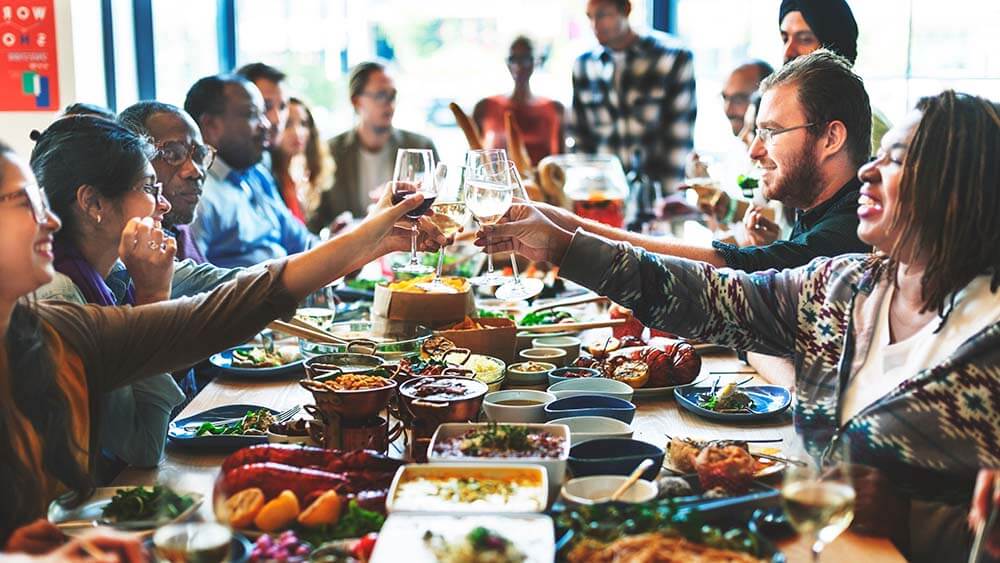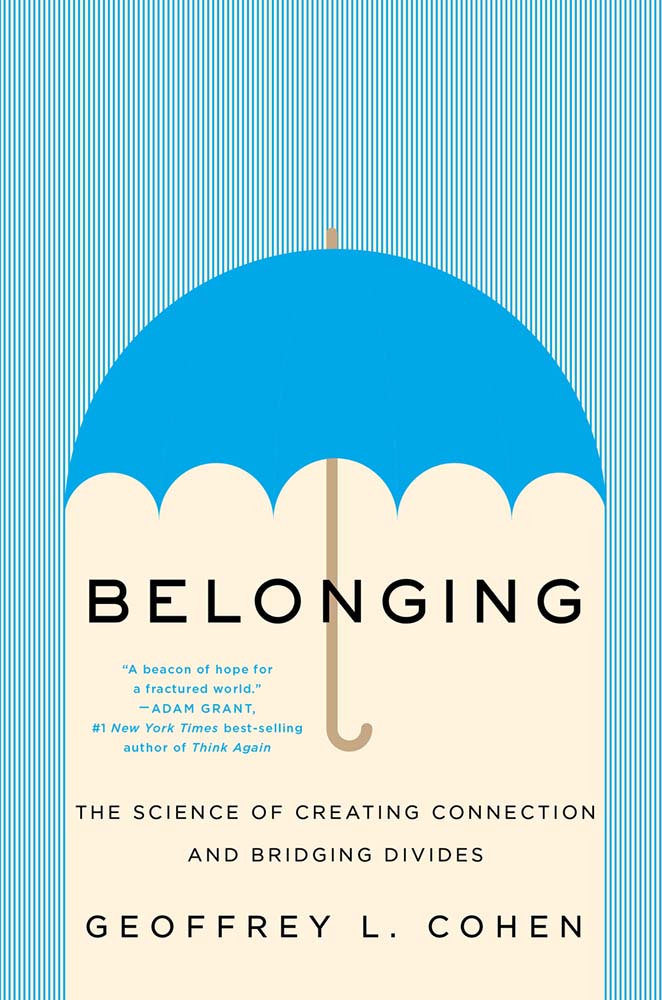
Sharing a meal together at events “is a way that we convey that
we like each other,” said Geoffrey L. Cohen, a Stanford University psychology professor and author of Belonging: The Science of Creating Connection and Bridging Divides.
“Belonging may seem like a comfortable but inessential luxury,” writes Stanford University psychology professor Geoffrey L. Cohen in his recently published book Belonging: The Science of Creating Connection and Bridging Divides. “However, it has potent, wide-ranging effects. We all know the sting of feeling as though we’re unwelcome,” even in brief encounters, he writes. “Feeling excluded is experienced in much the same way physical pain is, with both activating many of the same neural networks in the brain. Psychologists call it ‘social pain,’ saying people are as motivated to alleviate it as they are to slake thirst and find shelter.” Feeling like we belong is so critical to our wellbeing that “even fleeting experiences of belonging,” Cohen writes, “can have far-reaching benefits.”

Geoffrey L. Cohen
When Convene asked Cohen to consider the event experience as both an expert on belonging and a conference participant himself, he was intrigued by the possibilities. “I don’t know much about the industry,” he said, “but you could say [its] backbone … is trying to create belonging. Having a conference, spreading information, having a series of presentations, maybe there’s some sort of social event — the implicit purpose is creating that sense of, ‘We’re all here together and this is a place where we can all belong.’”
Like going to a restaurant and having “the feeling that your needs will be anticipated,” the best kinds of conferences, he said, “make you feel at home and welcome and they create an environment where you feel free to explore and interact, maybe even challenge yourself, while having the support of the other people around you.”
An “overly planned” program, however, Cohen said, can be “toxic to belonging. Belonging is often something that’s very organic. You have what social psychologists call ‘passive con- tact’ where you just bump into people serendipitously, and often those are the best kinds of connections. Having gone to a number of conferences, I’ve found that one thing that often undermines them is that they’re excessively planned and there are too many talks and too few opportunities for people to mingle and create those connections.”
He also recognizes that even if he has felt comfortable at a conference, “that doesn’t mean other people are,” he said. “And oftentimes, this is an interesting aspect of events — people who are historically marginalized or underrepresented might be experiencing them altogether differently.”
A Larger Purpose
What’s foundational about professional conferences is an “evocation of common purpose,” Cohen said. “We’re here together to … make inroads on social problems. This is our family, and these are people that I see over the decades who come and go, but there’s also the sense of passing on knowledge, passing on information to the next generation, being part of a chain because there’s multiple generations of people coming to these conferences — what social psychologists call a ‘superordinate identity.’ We are all part of a higher purpose, and that we feel an allegiance is really a pretty powerful basis of belonging. From everything from the keynotes to the little things, the welcome ceremony … I think when they’re done right, they evoke common values that we all have and make people feel like part of a common mission.”
Even the experience of eating together, Cohen said, “is a powerful bond builder. Sharing a meal together is a way we convey that we like each other.” Just being with others at a session is socially beneficial, he said. “There’s research that shows that when you’re listening to a talk with other people, you find it’s more interesting and more enjoyable” than if you were listening alone, Cohen said. He recalled an experiment where people at a museum exhibit said they enjoyed the experience more when they were looking at it with another person in the same room, even if they weren’t talking about what they were seeing.
 He also thinks “there’s an art to being a good host. I think part of it is introducing people to one another, something as simple as that, the art of introduction. So, a host will take note of someone who is feeling on the outside and channel them into situations where they could feel more connected, and that might be simply finding out a little bit more about the person’s interests and steering them to a [session] that aligns with their interests or values.”
He also thinks “there’s an art to being a good host. I think part of it is introducing people to one another, something as simple as that, the art of introduction. So, a host will take note of someone who is feeling on the outside and channel them into situations where they could feel more connected, and that might be simply finding out a little bit more about the person’s interests and steering them to a [session] that aligns with their interests or values.”
At mixers or networking events, Cohen thinks it’s a good idea for the host to simply say, “‘Okay, we’re going to take some time now for people to introduce themselves to someone that they don’t know.’ You give people a license to do that because otherwise it seems a little weird sometimes, especially for lonely or introverted people. That also helps people break down what we call ‘pluralistic ignorance’ — when we feel like we’re the only one who feels shy and awkward about introducing ourselves in a group, but it’s actually a very commonplace experience.”
Values Affirmations
When students write on a worksheet what they value most — like relationships and compassion — and why, that really helps them feel a greater sense of belonging in schools, Cohen said, “because they feel like their full self is being inquired about and being expressed. It helps their GPA, and it works especially well for those who feel like outsiders, like ethnic minority students who are discriminated against in schools, or women in science.” And Cohen can see how sharing these sorts of value affirmations could make conference-goers feel more at ease — “more like this is a place that welcomes them.”
He referenced another study, of bone marrow donors, to reinforce the importance of asking people to reflect on the values that direct them. There’s a long registration and screening process for bone-marrow donation and not everyone who volunteers actually follows through to the end. But researchers found that by adding just one question to the registration card, people were more likely “to go through the whole pipeline, from beginning to end,” Cohen said, “and actually donated their marrow.” That question is: What are the values that brought you here today? “That’s a nice little tweak, I think,” he said. “What are the values that are bringing them to your event?”
RELATED: Understanding ‘How Belonging Can Be Built’
Cohen surmised that there may be ways for people to express their values in a conference setting at an icebreaker or in small group sharing. He also said not to underestimate the power of having first timers welcomed and mentored by veteran conference goers. “It’s normal to feel like an outsider at these events, especially when you’re starting out,” Cohen said. “I especially remember as an assistant professor going to my first academic conference feeling totally out of place and really super insecure. I think it would’ve helped me a lot to hear, ‘Oh no, these esteemed silverback professors, they actually went through the same thing, and it’s something that passes with time.’”
“Prospective getting” is another social psychology tool that conference organizers can employ — the act of asking people what they want out of attending the event. And asking about barriers can be “really interesting,” Cohen said. “What are the barriers you’ve experienced of feeling like you can connect with people in these professional conferences? Just asking people these questions can really help a lot. Let’s find out what people want, what experiences they’re dreaming of having and what barriers to having these kinds of experiences they’ve encountered in the past.”
Michelle Russell is editor in chief of Convene.
